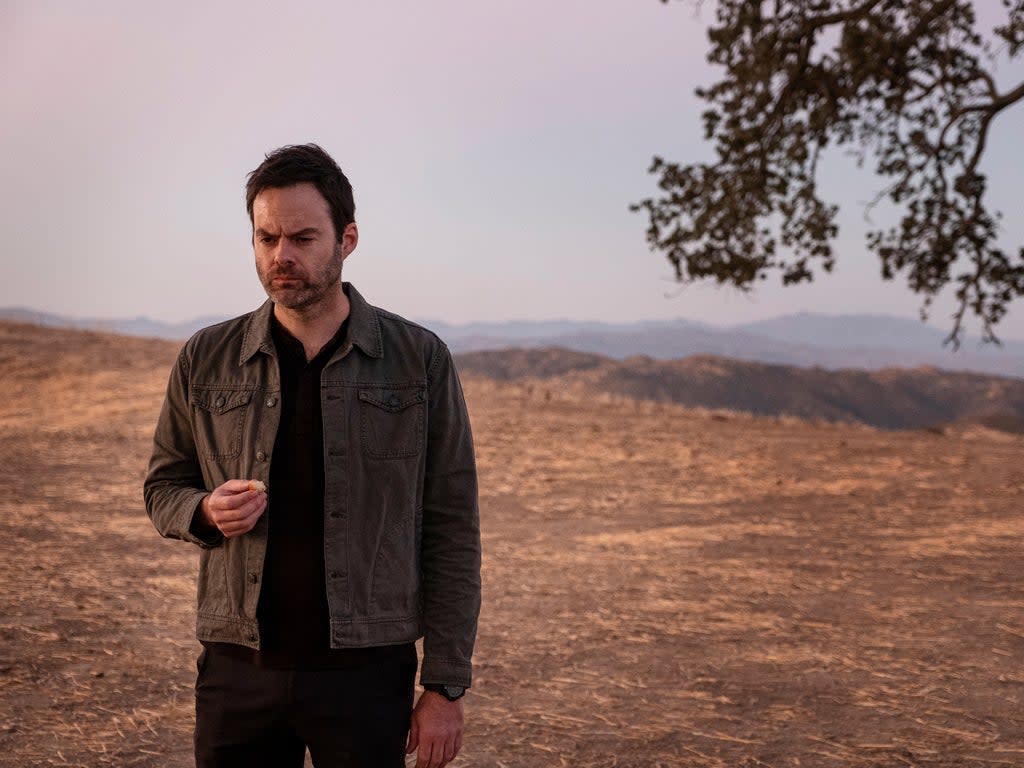Why isn’t Bill Hader’s sublime hitman show Barry the global sensation it ought to be?

- Oops!Something went wrong.Please try again later.
- Oops!Something went wrong.Please try again later.
- Oops!Something went wrong.Please try again later.
- Oops!Something went wrong.Please try again later.
- Oops!Something went wrong.Please try again later.
Barry is the kind of series that will make you unbearable to be around. It is the kind of series that will drive you to pester your friends, relatives, co-workers until they watch it. The kind that will lead you into a series of manic recaps and loud “remember the bit where…” moments whenever you encounter a fellow fan. A decade or two ago, it would have been embraced by box set snobs and placed proudly on DVD shelves between Curb Your Enthusiasm and The Wire. Yet in the age of streaming and with a cacophonous mass of possibilities at our fingertips, it has never been given the attention it truly deserves.
The series, which begins its third season tonight, focuses on Barry Berkman (Saturday Night Live alumni Bill Hader, who co-created the series with former Seinfeld writer Alec Berg), a skilled war vet turned contract killer, who stumbles into a Los Angeles acting class led by Gene Cousineau (Henry Winkler), a vain, faded thespian. Somehow Barry becomes more and more invested in the class, which quickly and serendipitously blossoms into a TV career, despite his abject lack of talent. He struggles to reconcile his newfound hobby with the pressures of his prolific hitman duties, however, with police investigations, shootouts and gang warfare involving the Chechan mafia running alongside his new Hollywood life. It’s a lot. The story’s twists and bends are impossible to predict; the superb season three premiere left me open-jawed.
In some ways, Barry is a direct descendent of the antihero crime drama from turn-of-the-century “prestige” TV. Like The Sopranos, Breaking Bad, The Shield or Mad Men, Barry focuses on an unlikeable male lead living a double life. Interestingly, this is a template that has receded in recent years, as the medium has shifted away from shows focused predominantly on white men; double lives are, after all, not a privilege afforded to everyone. But Barry is first and foremost a comedy, which should come as no surprise given Hader’s involvement. UK viewers may be less familiar with Hader, who rose to fame Stateside as a fan favourite on Saturday Night Live from 2005 to 2013. There, he was best known for his celebrity impressions, as well as the popular recurring character Stefon, a perennially nervous nightclub connoisseur who was once tipped for his own spin-off movie. During and after his SNL run, Hader did appear in more Brit-friendly hits like Superbad and Trainwreck, but Barry is a far cry from all of these. Often, when a series is described as a comedy-drama, it means it’s just a regular sitcom with a downer ending, or a drama that’s got a few mediocre jokes in it. Barry is a true fusion of both genres: bitingly, sometimes uproariously funny, but as gripping as the best pulp thrillers. It’s got all the craftsmanship of a “prestige” series but none of the pretension. So why isn’t it a global sensation?
In the UK in particular, Barry seems to have had a hard time pulling in an audience. This could partly be down to Hader’s smaller public profile, but also the channel on which it airs, Sky Comedy. Just 7.83 million households in the UK have Sky, with subscription service NOW adding a further 2 million to that. Even if every person who owned a Sky box tuned in to watch Barry’s season three premiere, it would still rank millions behind something like BBC One’s Line of Duty.
In the US, it would be wrong to suggest that Barry hasn’t been something of a hit, but only within the limited remit of an adult drama series on cable TV. After an acclaimed but not widely seen first season that bagged Hader and Winkler an Emmy each, Barry returned for season two, fortuitously airing in the timeslot immediately after Game of Thrones, which was debuting its much-hyped final season. Barry’s second season finale quadrupled the number of viewers its first had managed, going from 548,000 to 2.2 million.

More than ever, there’s a huge discrepancy between TV that is beloved by critics and the social media commentariat, and TV that is embraced by the public en masse. Gone are the days when something like The Sopranos could pull in more than 10 million viewers an episode; the goalposts for a “hit” have been drastically narrowed. Held up against the other contenders for the title of “best show on TV”, Barry more than holds its own. Its second season dwarfed viewership for the equally acclaimed Atlanta, Better Things and later seasons of Better Call Saul, also substantially outperforming Succession, which averages just over half a million per episode. But it still reached just a fraction of TV’s actual popular hits – HBO forbearers such as Game of Thrones or The Sopranos, or contemporary workhorses like Grey’s Anatomy or NCIS, whose mammoth audiences stretch into eight digits. When it comes to streaming services, it’s harder to compare data – Netflix and its competitors have always been highly selective about releasing viewing figures, and the recently introduced Nielsen measurements provide data only in “minutes viewed”. A look at Google search analytics, however, suggests that Barry is also still a long way off big hitters from Netflix and Disney Plus.
It’s a shame, because after a nearly three-year pandemic-exacerbated hiatus, Barry has returned to screens as brilliant as ever. In the opening episodes of season three, Hader is let off the leash. There is no mistaking Barry for a well-intentioned antihero anymore. We are watching a violent idiot, a murderer savant with several screws loose. His interactions with Winkler are particularly sublime. After decades in the shadow of Happy Days’ “The Fonz”, it’s great to see Winkler given a prominent role of depth and complexity, bringing his natural warmth to a figure others would have played as insufferably pompous. Elsewhere, amiable Chechan crimelord NoHo Hank (Anthony Carrigan) and aspiring actor Sally Reed (Sarah Goldberg) are no less deserving of attention. Every character on the show manages to somehow come across as funny, endearing, pitiable and despicable all at once.
If Barry was designed to make a case for the resurgence of the double-life drama, it would constitute a compelling one. But it’d be doing it a disservice to pigeonhole it as such. It’s one of the funniest comedies around and one of the most gripping crime dramas. If TV were a meritocracy, Barry would be the talk of the proverbial watercooler. So forgive me if I don’t shut up about it.

